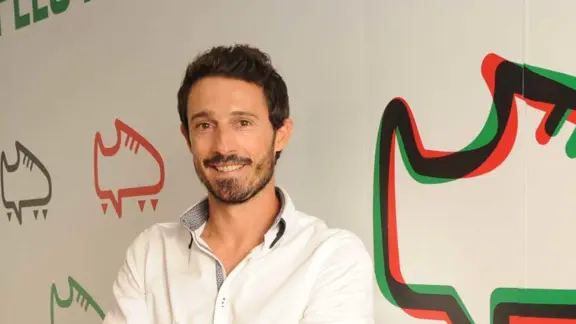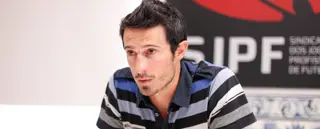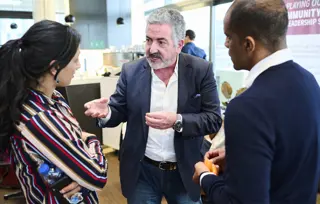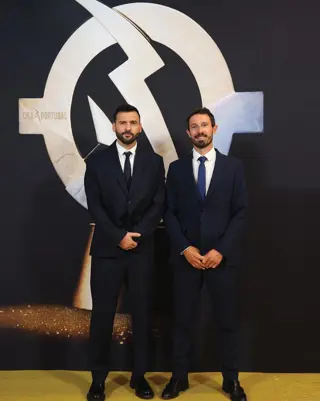News
People of the Union: Anselmo Cardoso (Portugal)

People of the Union puts the spotlight on individuals across FIFPRO’s member associations who are dedicated to improving the wellbeing of professional footballers.
Anselmo Cardoso, vice president of Portuguese player union SJPF, looks ahead to next week’s FIFPRO General Assembly in Lisbon, Portugal.
FIFPRO: Tell us about yourself: what’s your current role and background?
Anselmo Cardoso: I’m a former professional footballer and currently serve as vice president on the SJPF board. My main responsibility within the union is coordinating the educational services. As a trained Player Development Manager (PDM), I support players in choosing the best educational and personal development paths, helping them prepare in advance for their career transitions.
I spent many years playing in Liga Portugal, as well as abroad in Iran and Qatar, which gave me a broader understanding of the challenges faced by players around the world. Since I always knew I would need to build a career beyond football, I used my free time to invest in education — earning a degree in Education and Sports during my time in Liga Portugal and later completing a postgraduate qualification.
After joining the union as a player delegate, I completed a master’s degree in Sports Training and the PDM course — an initiative developed by the union in partnership with the Portuguese university ISCTE. Today, I travel across the country meeting with teams, sharing information about the union’s services, and using my own journey as an example. My mission is to understand players’ needs and provide the best possible support the union can offer.
What issue affecting player welfare are you most passionate about?
Among the different areas we work in, I would say that mental health, player wellbeing, and career transition are the ones I’m most passionate about – not only because they’re connected to my own experiences and knowledge, but also because, even though support has improved compared to when I was a player, there are still many challenges in these areas.
I believe in a multidisciplinary approach: education, vocational guidance, psychological support, and financial literacy are all essential to developing both the individual and the player. I often meet players who struggle with pressure, the uncertainty of injuries, or concerns about their contracts and future. With the right network and support, these problems can be mitigated. That’s why I accepted the challenge to join the union’s board – we need to advocate for policies that protect players’ development and wellbeing.

Can you share one of your proudest moments or achievements working as a union representative?
My proudest moments are always when I’m part of our collective achievements as a team. The work the union has done to support players’ education and development – and to strengthen the role of footballers within our national football industry – is widely recognised. More and more former players are now taking up roles within club structures or leadership positions in various organisations.
It was the pioneering work carried out by the union, including the fight against overdue payments and the improvement of players’ contractual and financial stability, that gave us the foundation to focus on and invest in players’ education and personal development.
Is there anyone in the union world or in sports in general who inspires you?
There are two players that will always deserve my tribute for the impact they’ve had on the world of football: Jean-Marc Bosman and, more recently, Lassana Diarra.
Cristiano Ronaldo, our national team captain, is an example and an inspiration that goes far beyond football – a symbol who motivates generations and embodies dedication, solidarity, and respect. As a union representative, I’m also deeply inspired by our President, Joaquim Evangelista, who has spent almost two decades fighting for players’ rights under very challenging circumstances. I have the utmost respect for everything he has helped achieve for players in Portugal.

What is your favourite football memory to date?
Despite having played at the highest level, my happiest football memories come from my early days – being a kid dreaming of becoming a footballer, playing with friends in the street, using stones as goalposts and, at times, kicking a can instead of a ball. Kids of my generation didn’t need much to enjoy the game.
At the professional level, I’ll never forget my first official match for SC Torreense, my hometown club. Hearing the club’s anthem as I walked onto the pitch was an unforgettable moment, filled with pride. I also have fond memories of my first experience abroad, in Iran, where I was struck by the incredible passion and purity of the fans’ support. Their love for the game was unconditional, no matter the team’s results. Witnessing that devotion gave me a whole new appreciation for football.
If you could change something in football, what would it be?
I would change the role of the player within the football industry. Without players, there is no game – yet some political decisions continue to go against their rights and wellbeing.
I would also like to see greater solidarity among players from different economic and social backgrounds, and stronger unions to ensure that all players’ interests are respected and valued.
Another important change would be addressing the culture of aggression and violence directed at players, referees, and fans. We need to start by educating parents – encouraging their children without putting them under pressure. Sport should promote a safe, respectful, and healthy environment at every level, from grassroots to the professional game.

FIFPRO is celebrating its 60th anniversary in 2025. What does being part of a global union mean to you?
For me, it’s both an honour and a responsibility. It means belonging to a vast network that amplifies the voices of players around the world. FIFPRO shares best practices and offers transnational solidarity in addressing our common challenges, helping players facing precarious conditions and constant mobility, defending labour rights, and promoting social protection.
The global reach of FIFPRO gives us the opportunity to discuss key issues with international stakeholders such as FIFA and UEFA, and to influence policies that shape football worldwide. I’m proud to contribute to this cause, not only for the benefit of today’s players but also to protect and improve conditions for future generations. Sixty years is more than just a milestone – it represents the preservation and continuation of a remarkable legacy.
What do you hope to see unions unite more on to shape the future of football for the players?
I hope to see more cooperation between unions, on three fronts: protecting labour rights (fair contracts, social security and faster and more effective dispute resolution systems), developing transition and educational programs (dual careers, financial literacy, and entrepreneurship), and providing solutions to protect mental health and wellbeing. The union movement must also guarantee inclusion and representation, ensuring that the voices of players from all levels and backgrounds are heard. We need to stand united, communicate effectively, and intervene at the right moments to make a lasting impact.
What is your message ahead of Portugal hosting the FIFPRO General Assembly?
I would like to begin by extending a warm welcome to all FIFPRO members. We are very excited to host this global congress in Portugal, especially on such a meaningful occasion: FIFPRO’s 60th anniversary. Our team is doing its utmost to ensure it will be a memorable event for everyone.
I’m confident it will be a special moment for all our guests: a global gathering where we place players at the heart of decision-making, exchange valuable experiences, and strengthen our collective action. Lisbon has hosted many major football events over the years, but this General Assembly will be truly unique and an opportunity to honour different generations of players and celebrate their contributions to the game.
